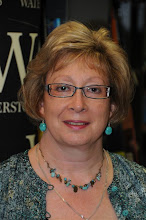This morning, I enjoyed a soothing swim in a near empty lane at Greens, followed by my neck stretches and deep breathing exercises in the steam room and a quick chat with a couple of regulars in the sauna.
Since I was heading almost directly for the hairdressers afterwards for a bit of shaping, I missed out a couple of stages in my strict routine and just blow dried my hair, without first shampooing and conditioning it. Looking in the mirror at the unnaturally blonde bush the phrase, straw hingin' oot a midden', came to mind.
Being both Scottish and Jewish, I realise that I enjoy the benefit of two highly expressive forms of language - Glasgow patter and Yiddish. Admittedly, my knowledge of Yiddish is fairly limited, but it's enough to know that there's a real richness to be found in both.
For instance:
heid banger - meshugenner
eejit - shlemiel
mingin' - farshtunken
heid bummer - gantseh macher
Another advantage of being both Scottish and Jewish, is that I have no difficulty pronouncing words with 'ch' in them, unlike many English folk.
How often have you heard strangers talk about 'Lock Lomond' or 'Auckenshuggle'?
As Jews, the 'ch' sound is part of our daily lives - we say, l'chaim, celebrate Chanukah and eat our chopped fried fish balls with chrein (horseradish sauce).
All part of a nice rich blend.
Friday, 12 March 2010
Subscribe to:
Post Comments (Atom)


Yiddish has some cracking expressive words. Mensch for example. And some cracking swear words, but we'll draw a veil over that for now. I'm liking meshuganner (is that how you spell it?)
ReplyDeleteYes, I know a great joke in that makes use of the double meaning of a Yiddish word.
ReplyDeleteThere are lots of great phrases that I couldn't think of Glescae parallels for.
For instance, ferkrimpter ponum, refers to someone who always goes round with a miserable face.
And you often find someone described as 'a real meshuganner hunt (pronounced 'hoont'), which translates as 'mad dog'. There seem to be a great many variations in spelling of most Yiddish words.
My parents spoke Yiddish at home whenever they didn't want me to understand what they were saying. Eventually, they realised Yiddish wasn't a mystery for me any longer and they switched to Russian (unfortunately, I never picked that language up as well as I had Yiddish). Years ago, I found I could also speak it a little when forced to - like in Mea Shearim (Jerusalem). But my parents were still alive at the time; now that I don't hear it spoken around me, I've forgotten an awful lot of it; I only understand people who come from the same part of Russia/Poland as my parents, anyway. Those differences in accents account for the variations in spelling that you mention. That, and the fact that it is written with the Hebrew alphabet, of course.
ReplyDeleteI love Yiddish. :-)
Yes, it is such a wonderfully expressive language and quite often the richness of that expression gets lost in translation.
ReplyDeleteBut I also used to really love Stanley Baxter's Parliamo Glasgow.
Many thanks, Rodriguez - wish I could understand what these recent comments mean - I just hope that they aren't rude!
ReplyDelete